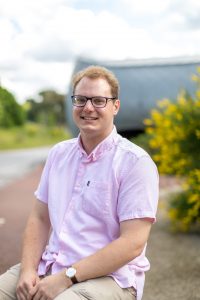July 24, 2019, by pmzmah
An interview with Rowland Seymour
We’ve been catching up with one of our PhD students and recent EPSRC Doctoral Prize winner Rowland Seymour. We’ve been talking about all things relating to his recent triumphs to his field of work.

What made you want to apply for the Doctoral Prize Fellowship?
I got involved with Theo’s assignment research priority area, they hosted a sandpit day where they had people from lots of other departments get involved and they brought along their own projects. I met someone there from the N/LAB in the business school, off the back of that we successfully applied for some funding for a three month project. We found out that three months is not very long in the world of grants and research, we only managed to scratch the surface. That’s when I applied for this Doctoral Prize, I thought this would be a really great opportunity to mix my PhD with the stuff I’ve been doing in N/lab, and get some more money and more time to this.
How did you find the application process?
I underestimated the amount of effort and time you need to put into this, but David Hawker was really helpful and I got support from so many people from the school. The sheer amount of stuff you need to think about was a shock, the mathematical content is the most important, but there’s impact and outreach to think about too.
What’s the link between you PhD and this upcoming project?
So my PhD is about bird flu and foot and mouth dieses, it wasn’t until I got involved in the research priority day that I learnt about maths for international development and the statistics for that, so this prize and fellowship is a way of pivoting to a new area. I think this will help me develop in my career, go onto bigger fellowship in the future and I’d love to use this opportunity to lead a research group in this area.
So what’s the research topic?
Mathematics or statistics for international development, specifically helping cities and developing countries. As they grow very quickly, there can be lots of problems with inequality, poverty and modern day slavery (which is something the human rights lab are interested in). For example, recently there’s been an outbreak in cholera in Tanzania, that’s caused a lot of problems for the area, so my work is trying to identify areas in cities where people need help and what kind of support they need. One of the problems that I’ve encountered is that there’s not much data around or available from the governments, either this isn’t collected or isn’t not very good quality or unreliable. So, we’re using lots of alternative data sets like bus maps and telephone communication data, and we’re using those kinds of things alongside survey from people who live in the cities themselves.
Is there anything you’re particularly excited for?
One thing I’m really excited about is one day workshop I’ll be organising, the aim is to bring people together from both inside and outside the university. I’ll also be taking part in the summer project scheme for the Undergrads here so I have got some money to help out with that. Some of the money will be used to go to Tanzania which will be really exciting as I’ve spent all this time researching these places, I’m looking forward to going and seeing them.
Was maths research something you’ve always considered doing as a profession?
I’ve always been interested in maths and research. My supervisor has been really good at pushing me to do more exciting things, putting myself out there and getting involved in more maths research and travel grants, attending conferences. I’m definitely looking forward to getting into international development, it’s different to what I’m used to and it’s interdisciplinary work. The thing with maths is you can write down definitions and define things really easily, everything is very strict and precise, whereas with international development it’s so vague. One of the best things about this is that I’ve got some money to get involved with NGOs and some charities, so I can invite them to the workshop I’m organising and see my work get translated into a policy.

[…] You can read more about my prize and an interview with me here. […]